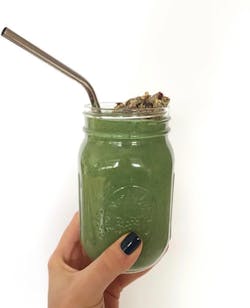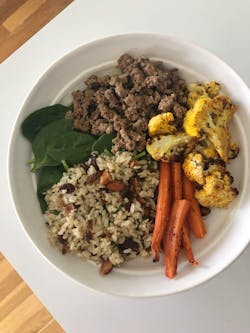Health & Wellness: A Dietary Approach to Supporting Immune Health
It is undeniable that nutrition is a modifiable factor—one that you control—that affects your health in great ways. A variety of health concerns are associated with nutrition and weight, such as heart disease, diabetes and inflammatory conditions, as is overall general health. Furthermore, there is the idea that your diet not only can affect your well-being, mood, level of stress and/or athletic performance but can serve as a prevention and/or treatment strategy for many conditions.
Simply put, nutrition can’t be underestimated in regard to its effect on your health. Enter the COVID-19 pandemic, and stress and immune health have come to the forefront by default.
How can you support your immune system through food? What steps allow you to make positive, attainable changes to your diet in support of your immune response and general health?
Understand foods, nutrients
Start with the gut! Did you know that approximately 70 percent of your immune system is found within your gut? This important connection allows us to concentrate on supporting gut health, which by default improves immune health. Foods of focus here are ones that support the microorganism environment within the gut, ones that have prebiotics and probiotics (think fibrous fruits and vegetables and fermented foods, such as kraut, kimchi and unsweetened yogurt).
Incorporate a variety of nutrient-dense, whole foods, such as quality animal proteins, whole grains, fruits, vegetables and healthy fats, while limiting processed foods and added sugars to support your immune system and stress response.When choosing fruits and vegetables, aim for a variety of different colors to avail yourself of different micronutrients (vitamins and minerals) to support your health. A general rule of thumb: The brighter that the produce is, the more nutrient-rich that it is.
There are a variety of nutrients of interest that can support your immune health. Antioxidants, such as vitamin A and C, zinc, vitamin D3, omega-3 fatty acids and/or a multivitamin are some of the most researched and discussed nutrients. The best way to achieve adequate levels of these nutrients is to focus on incorporating a variety of nutrient-dense foods and/or to supplement when needed, in consultation with your healthcare provider to ensure that your choices are sound nutritionally and health-wise.
Boost flavor plus immune-supporting properties by incorporating fresh herbs and spices, such as garlic, ginger, oregano and turmeric, which are antimicrobial and/or anti-inflammatory.
Stay hydrated. We tend to underestimate the importance of being hydrated in regard to our immune health and recovery response when sick. Keep a reusable water bottle handy. Fruit-infused water, hot water with lemon (also can add ginger and/or honey) and herbal tea are great options to add to your routine. (For a more detailed read on hydration, check out “Hydration 101: Tips to Stay Hydrated While on Shift.”)
Immune-supporting foods
Putting this information into practice needs to be easy and attainable for you for positive habits to stick and for potential health benefits to be seen. The goal is to make immune-supporting nutrition feasible. It must be realistic to incorporate into your current or new routine. Three easy ways to incorporate nutrient-dense foods of interest into your diet that are friendly both on and off shift are:
Blend up a balanced and filling smoothie. A smoothie is a great way to create a nutrient-dense option that is adaptable to your individualized nutrition goals. You can get in nutrients quickly, blend up different flavors and control the macronutrients (carbohydrates, fat and protein) based on the ingredients that are added. A smoothie also is a great option for incorporating vegetables into your diet. You can “hide veggies” that have little flavor or ones that can be masked by other stronger flavors (i.e., fruit, nut butter or cocoa powder). Plus, preparation time is five minutes or less, and, if needed, you can take it on the go.
My go-to formula for a balanced smoothie that is filling, nutrient-dense and hormone-balancing that can be customized to your liking is: fruit + greens + protein + healthy fat + liquid of choice. It’s a bonus if you’re able to add extra veggies into the mix, with some popular ones being cauliflower, zucchini and sweet potato. I recommend smoothies, because the flavor and nutrient combinations are endless (e.g., peanut butter cup, berry banana or a sweet potato pie), and you can pack in the nutrients with a simple blend.
Create nutritious and tasty soups. Incorporating soups into your diet can be both immune-supporting and hydrating. Soups serve as a great option that can be, once again, customized to your preference from nutrition to flavor. Choosing a nutrient-rich broth, such as bone broth, adds extra immune-supporting nutrients because of its longer cooking process. Plus, you can doctor it up with anti-inflammatory spices or create a blended soup with the addition of a roasted vegetable option (e.g., broth + caramelized onion + roasted vegetable of choice).
Build-a-Bowl. This is a way to make a quick and easy meal at the fire station that is flexible and tailored to each individual. Setting up a “build a bowl buffet,” where you incorporate different proteins, grains, vegetables and flavors, can incorporate quality, whole food ingredients. There can be something for everyone’s nutrition, taste and dietary preferences.
Please the entire crew or your family at home by using a build-a-bowl formula that includes a base + protein + veggies + sauce + toppings for a nutrient-dense, filling and satisfying meal.Actionable steps
Take a look at your current diet and focus on how you can support your immune and gut health. What small improvements can you make that can potentially affect your immune health? If you’re up for a challenge, pick small goals or steps that add up that can fit within your health and wellness routine. (Aim for one to three that are attainable and within your reach and continue to improve on them or add more with time.) Eventually, these small steps can turn into bigger sustainable steps that support your immune system and overall health—not just today, not just on the job, but for life.

Dana Harrison
Dana Harrison, MS, is a nutritionist and educator who is based in Massachusetts. She received a bachelor’s degree in biology from Vassar College and a master’s degree in nutrition science (community nutrition concentration) from University of Massachusetts Amherst. Harrison is the founder of The Cultural Shift Method, which is a nutrition education program that makes nutrition, health and wellness easy, individualized and attainable. She presents simple, realistic, sustainable and dynamic plans for positive health and wellness behaviors, which allow for changes to occur on a cultural level. For more information, visit www.eats2know.com or contact her at [email protected].









